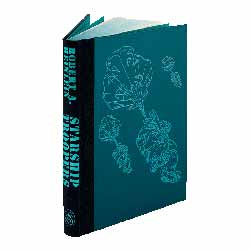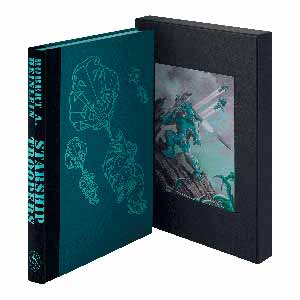|
Click here to return to the main site. Book Review
Rico, having reached the age of consent, goes against his family’s wishes and joins the military. Intending to only stay in for two years and qualify for citizenship privileges, the outbreak of war sees his platoon thrust into battle against a strong and intelligent alien species… Starship Troopers (2019. Originally published 1959. 272 pages) is a military science fiction novel from Robert Heinlein. Heinlein, who died in 1988, was a well-respected novelist having penned some of the most seminal works in the genre, including Stranger in a Strange Land (1961) and The Moon Is a Harsh Mistress (1966). Starship Troopers was his first non-juvenile book in ten years and proved to be a controversial work, so much so that his then current publisher refused to put the book out. It and its author have been labelled as both fascistic and racist; however I feel that this notion often came from a fundamental misreading of the text. It does raise the question as to whether it is possible to divorce the work from the author. Heinlein was a military man having served in the navy, an experience which would inform this story. The depictions of boot camp, as well as the travails of officer school have an authentic feel about them. Some have accused him of being a reactionary against the growth of youth culture and a perceived lack of civic responsibility and morality, against a background of the liberalisation of sex and experimentation with recreational drugs. This accusation is difficult to sustain when you can also point to Stranger in a Strange Land (1961), a book which was adopted just as much by counter culture as was Tolkein’s, Lord of the Rings (1954). The book was also accused of putting forward the proposition that only those who have served in the military should be allowed to vote or hold high office. There is a debate within the book about the relative merits of earth’s political structures, but even within the novel, it is accepted, that the current political structure is only accepted on the grounds that it seems to work. Troopers Earth is one of high wealth and security for its citizens. People are not looked down if they choose not to engage in the state. The book explicitly states that in a time of peace most of the people who have signed up for civic duty are not in the military, but in civilian branches. When the book is not side-tracked into political and moral philosophy we follow Juan ‘Johnny’ Rico who feels that he wants to become a full citizen and so ends up in the mobile infantry. Mobile because each soldier is encased in a battle suit, this is more than a spacesuit, but slightly less than a tank. The power the suit provides gives Johnny and his platoon an edge, sometimes. The accusation of racism often comes from the fact that the alien race is called skinnies or bugs. That may not be polite, but then one of the jobs of the military is to dehumanise the opposition so that it is easier to kill them and has always been a reflection of the realities of war. I feels more like Heinlein is reflecting the real military practice, while at the same time accepting that the aliens are just as smart as humanity and if the war goes badly, Johnny muses, that maybe it means that humanity has no place in the stars. The story spends a lot of time in boot camp, with only short but violent clashes with the enemy. It is within this context of school lessons where Heinlein engages in much of the book's proselytising. There remain those, today, who continue to feel that the book is controversial, so it’s good to see that the Folio Society continues its commitment to publishing important books, regardless of their notoriety. The Folio addition arrives with six illustrations, two of which are double paged, created by Stephen Hickman, an American artist, who works mainly in science fiction and fantasy, having previously provided art for Gordon Dickinson, H. P. Lovecraft and Tolkien, amongst many others. The introduction is by Joe Haldeman, author of The Forever War (1974), which many felt was a rebuff against the jingoism of Troopers. He discusses his admiration of Heinlein as a writer while simultaneously disagreeing with him on many of his stances about the morality of war. In line with other editions, the book comes in its own slipcase which has a three-quarter illustration of the power suits in operation in a very retro fifties look. It’s a little difficult to discern the writing on the shoulder, but I’m presuming that we should take this to be Johnny in action. The overall book has gone for a single colour theme, with blue/green metallic used throughout. The mail cover of the book has no title, this is found on the spine, but does have a nicely embossed depiction of three troopers parachuting down. The page edges are likewise covered in the metallic colour. The pages are quarter-bound in blocked cloth set in Meridien with Stencil display. The whole thing is brought together with Folio's usual eye for providing a superior product. 10 Charles Packer
|
|---|

